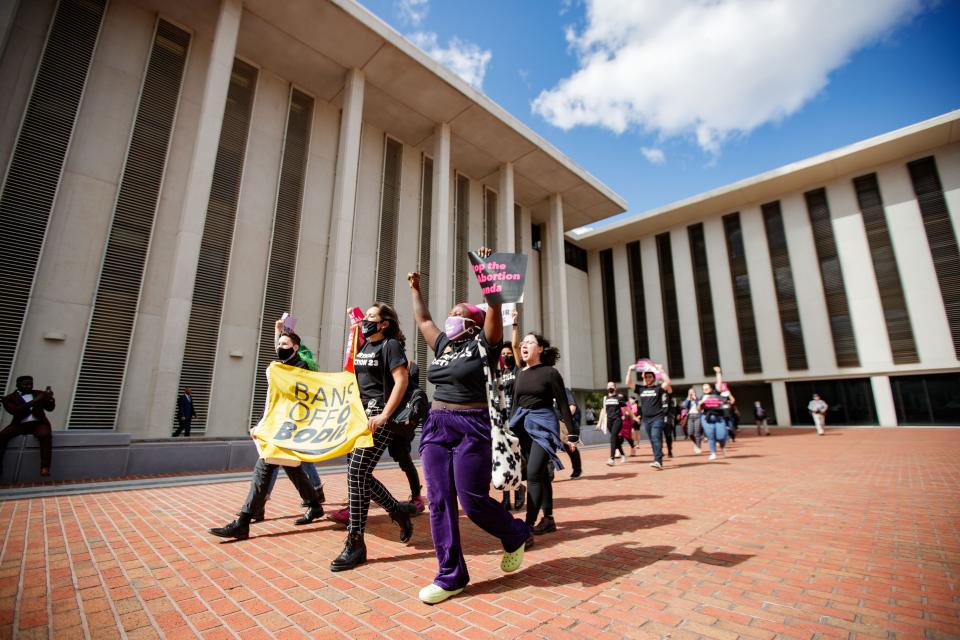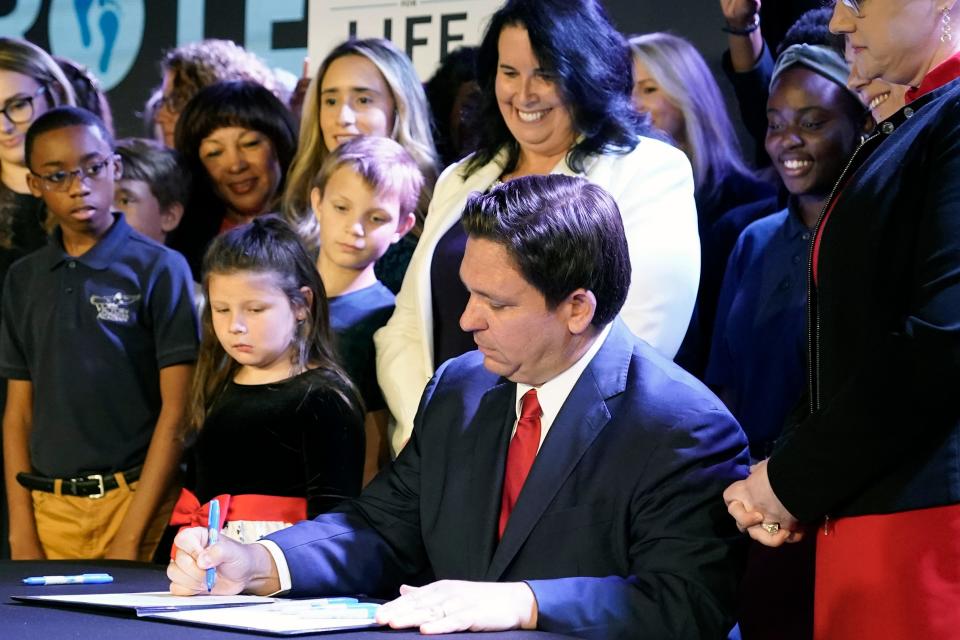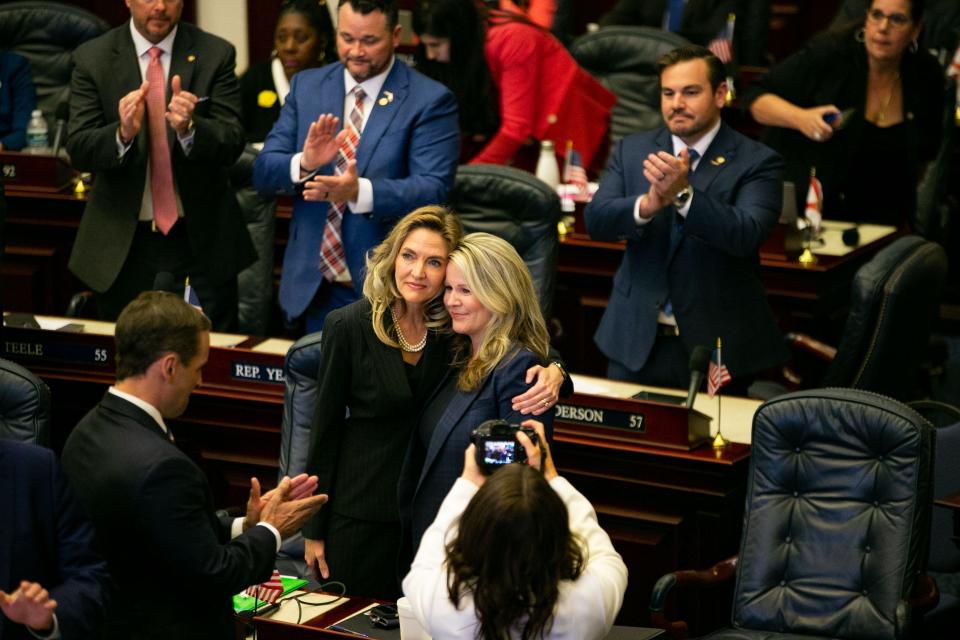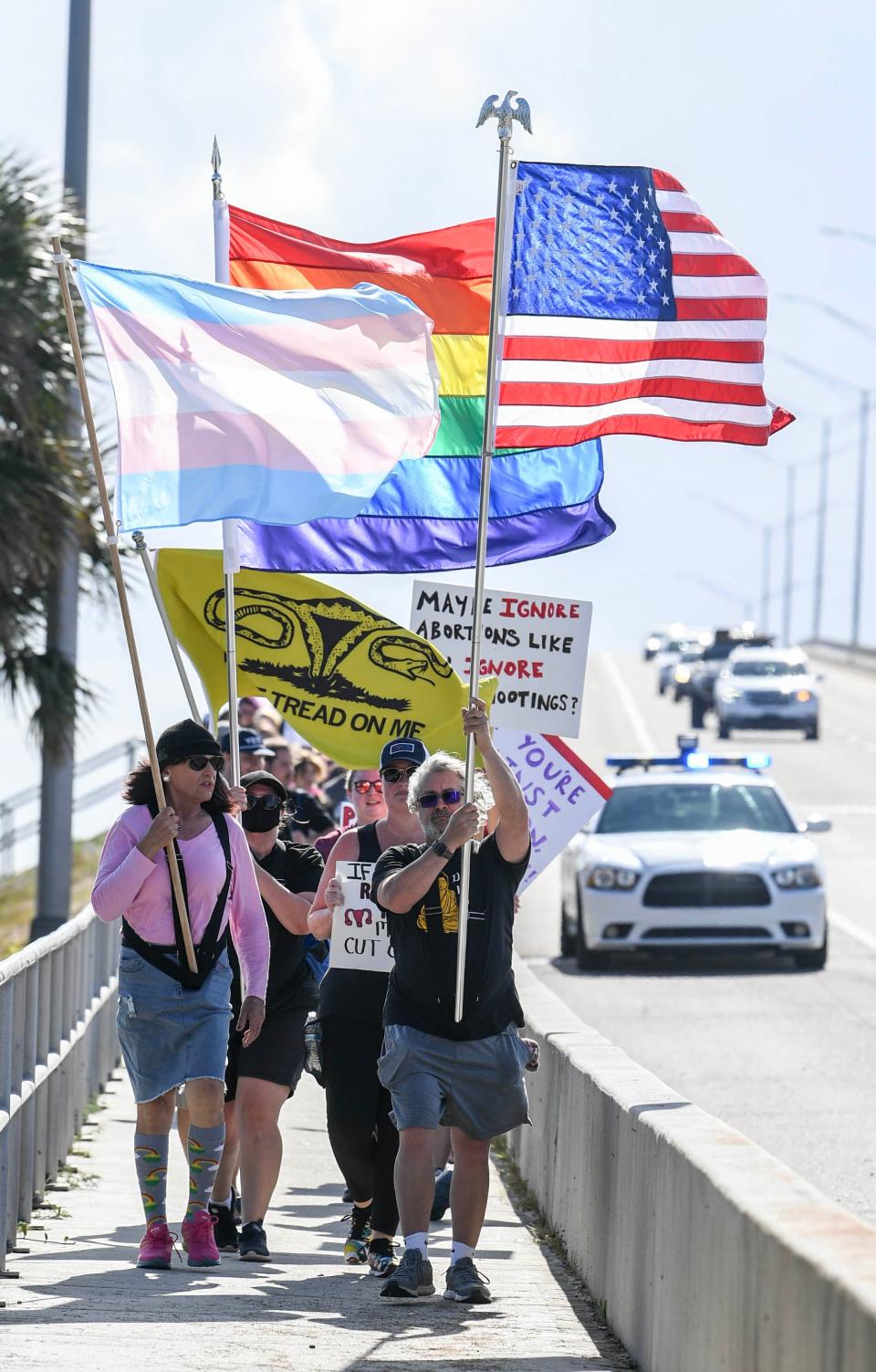Abortion access on the line in Florida before DeSantis-heavy Supreme Court
- Oops!Something went wrong.Please try again later.
TALLAHASSEE – Abortion access in Florida is on the line this week before the state Supreme Court with a majority of justices appointed by Gov. Ron DeSantis being asked to overturn 34-years of legal precedent involving the state’s right-to-privacy.
The state is set to argue Friday that more liberal-leaning justices got it wrong more than three decades ago when they ruled unanimously that a voter-approved privacy clause in the state constitution provides a fundamental right to abortion.
If justices reverse that ruling, the state’s current law banning most abortions after 15 weeks would be upheld, but only temporarily. DeSantis and the Republican-controlled Legislature, banking on a favorable ruling from the conservative court, have already approved a six-week ban set to take effect 30 days after such a decision.
Florida now provides the most abortion access in the Southeast. But it will become a very different place if justices side with DeSantis.
“It’s going to get a lot worse here before it gets better,” said Rep. Anna Eskamani, an Orlando Democrat, who said any optimism stems from efforts to get a ballot initiative before voters next year that would guarantee abortion access up until fetal viability, which has been put at about 24 weeks gestational age.
The proposal aimed at voters has collected enough signatures – close to 300,000 – to trigger a review of its ballot language by the Florida Supreme Court. Almost 900,000 valid petition signatures are needed for the measure to get on the November 2024 ballot.
But for now, abortion rights advocates are close to conceding that a DeSantis-leaning court will find a way to exclude the procedure from privacy protections carved into the state constitution.
Most assume that the six-week law will soon be in place. Many women don’t know they’re pregnant at six weeks, advocates say.

Further affecting that tight timeline, Florida already requires two doctors’ visits and a 24-hour waiting period before an abortion.
“Florida is going to have even tougher laws that you have to navigate as a patient, who is already in a crisis situation,” said Laura Goodhue, executive director of the Florida Alliance of Planned Parenthood Affiliates, among the organizations challenging the 15-week law.
“It is a horrible way to get medical care,” she added.
But John Stemberger, president of the Florida Family Policy Council, which championed the six-week law, said the state is poised to assert itself in a region with laws aggressively discouraging abortion.
“We’ve been a destination state, not just for entertainment, the arts, springs and beaches,” Stemberger said. “We’re a destination state for terminating pregnancies as well.”
Presidential politics in play
Like just about everything involving DeSantis, the case before justices is shaded by his foundering presidential campaign.

DeSantis’ White House chances are widely seen as facing a make-or-break moment in January’s Iowa caucuses, where evangelical Christians make up about two-thirds of the Republican electorate.
While DeSantis’ signing of the six-week restriction has alienated some of his top campaign donors who support a more moderate approach on many social issues, the governor is unwavering.
Still, GOP presidential frontrunner Donald Trump has repeatedly claimed credit for the U.S. Supreme Court’s decision last year overturning Roe v. Wade, eliminating the constitutional right to abortion nationwide after almost 50 years and returning it to states to regulate.
Months later, DeSantis pushed Florida lawmakers in the recent spring session to enact the six-week ban, down from the 15-week standard approved only weeks before the high court threw out Roe last year in ruling on a similar Mississippi abortion law.

Order from the court: Leon County judge rules Florida’s 15-week abortion law unconstitutional
Deep dive into privacy's origins: Florida has a unique right protecting abortion. Its framers designed it that way.
Trump, as president, appointed one-third of the justices currently on the high court – and all of them voted to reject Roe.
Still, the former president has criticized Florida’s six-week restriction as “too harsh.”
DeSantis defended the new law after Trump’s criticism, saying he was “proud” to sign it. Now, seeing that law take effect before the Iowa caucuses might help resuscitate his fading presidential bid.
Poll shows voters don't want six-week limit
A recent poll on abortion showed a wide majority of Floridians oppose the six-week ban. About 75% of registered voters surveyed in March by the University of North Florida either somewhat or strongly opposed the limit, including 61% of Republicans who opposed it.
Justices are being asked to revisit the privacy provision after Leon County Circuit Judge John Cooper ruled the state’s 15-week law unconstitutional because of the 1989 “T.W.” decision by the Florida Supreme Court.
The current Supreme Court, five of whose seven members were named by DeSantis, allowed the law to stay on the books while it was being appealed, a signal they may be inclined to side with the state’s case for revisiting the privacy right.
One justice who preceded DeSantis to the Supreme Court is Charles Canady, who sponsored anti-abortion legislation as a Florida member of Congress in the 1990s. His wife, state Rep. Jennifer Canady, R-Lakeland, co-sponsored the six-week abortion law in the House.

In that decades-old “T.W.” case, justices struck down the state’s parental consent law for minors seeking abortions, ruling that the state constitution’s privacy right barred state interference.
“Florida’s privacy provision is clearly implicated in a woman’s decision of whether or not to continue her pregnancy,” the late Justice Leander Shaw wrote in the opinion. “We can conceive of few more personal or private decisions concerning one’s body that one can make in the course of a lifetime...”
Justices ruled a right to abortion was included in privacy clause
The seven-member court was unanimous in finding that the state constitution provided a fundamental right to abortion, while a four-justice majority voted to strike down the parental-consent law.
Even a current member of the state Supreme Court, Justice Carlos Muniz, appointed by DeSantis in 2019, cited the privacy right as designed to protect abortion in a 2004 article in the Journal of the James Madison Institute.

“In this context, one purpose of the privacy amendment clearly was to give the abortion right a textual foundation in our state constitution,” Muniz wrote, noting Florida voters endorsed it only seven years after a right to abortion had been acknowledged by the U.S. Supreme Court.
In arguing against the law now, however, court briefs from Attorney General Ashley Moody’s office deny that abortion rights were what voters were thinking in 1980, when 61% of them endorsed the constitutional privacy amendment.
It declares simply:
“Every natural person has the right to be let alone and free from governmental intrusion in the person’s private life except as otherwise provided herein. This section shall not be construed to limit the public’s right of access to public records and meetings as provided by law.”

State argues court was misguided decades ago
More than 100 briefs have been filed in the case Friday before Florida justices. In its filings, the state argues the Supreme Court was misguided in 1989 when it interpreted the privacy right as applying to abortion.
“It ignored that the provision’s plain text says nothing of abortion, that its drafters publicly disavowed guaranteeing abortion rights and that the provision was ratified in response to decisions restricting informational privacy,” the state contends.
“Were this Court to address the meaning of the Privacy Clause here, it should therefore recede from its precedents and clarify that the original meaning of the clause has nothing to say about abortion.”
Instead, the state contends the privacy protection was created solely to safeguard Floridians’ ‘informational privacy.” Included in the state’s filings are lengthy records of more than four-decade-old committee hearings and dozens of newspaper clips that fail to mention abortion rights when discussing what the 1980 ballot measure may address.
The state argues that absence should prompt current justices to reverse the 1989 ruling that the privacy right covers abortion.
But attorneys for the American Civil Liberties Union Foundation, on behalf of the Planned Parenthood affiliates, dispute the state’s logic.

“The State spends the bulk of its brief arguing that the Privacy Clause protects informational privacy – an uncontroversial position irrelevant to this case,” the plaintiffs write.
They go on, adding, “What the State fails to provide is any textual basis, legal authority or contemporaneous evidence that the Privacy Clause protects informational privacy to the exclusion of decisional privacy rights like abortion.”
John Kennedy is a reporter in the USA TODAY Network’s Florida Capital Bureau. He can be reached at jkennedy2@gannett.com, or on Twitter at @JKennedyReport
This article originally appeared on Tallahassee Democrat: Florida abortion access on the line: Supreme Court weighs ban, privacy

